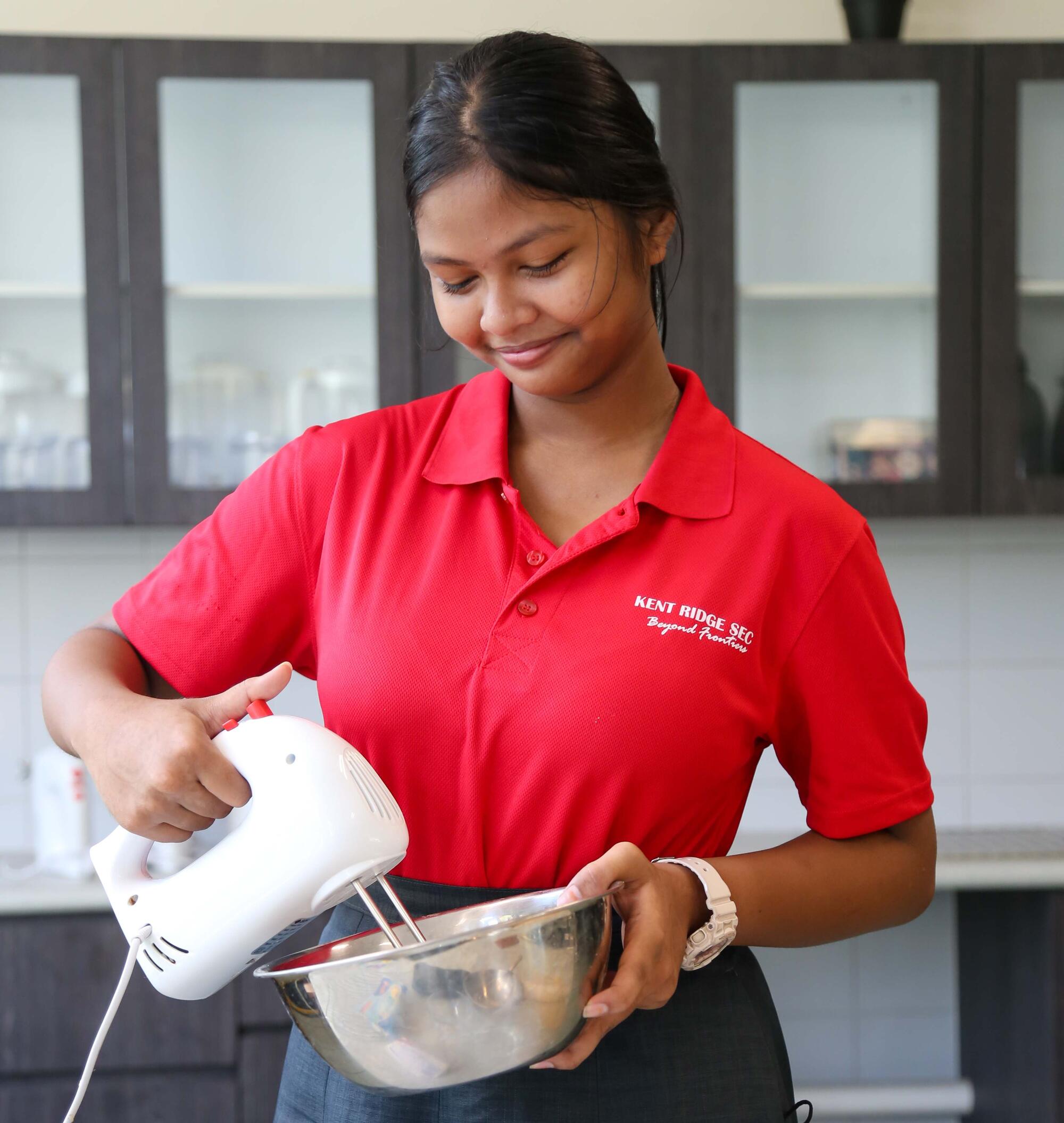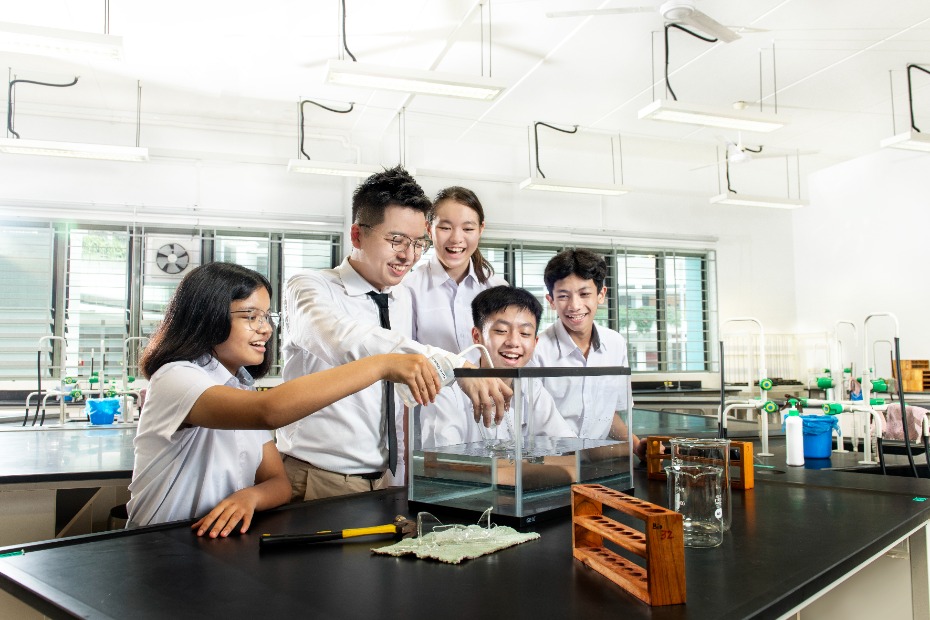Lessons for Singapore from Half a World Away
24 May 2011

Master Teacher Mdm Yau Li Heong (in black jacket) leading members of a Science professional network committee in a teambuilding activity.
Lying prone on the grass with a measuring tape in hand to mark the distance covered by a “rocket”, a student scribbled some figures into his notebook. Elsewhere in the field, other 16-year olds were doing the same – launching rockets from various angles and taking measurements to compare their ‘field’ results with the theoretical predictions of their science textbooks.
Recalling this scene, Mdm Yau Li Heong, a Master Teacher for Chemistry, noted how these students, who were from a school in Maryland, USA, were keen learners with positive attitudes and good classroom behaviour. She found this an interesting contrast to their personal style, which often screamed outrageous individuality through fashionable hairstyles, colourful outfits and painted nails.
Along with Mrs Lee Hwa Phaik, a Master Teacher for Geography, Mdm Yau was in the United States thanks to the Fulbright Distinguished Awards in Teaching, an international educational exchange programme supported by the US government. During their four-month stay in America, the two Master Teachers observed how various subjects were taught as well as how a different social, cultural and educational landscape affects the way students learn in school.
Teachers as facilitators
Mdm Yau, who visited a high school of ninth to 12th graders (which corresponds to the Secondary 3 to Junior College levels in Singapore), was struck by a world of difference in the classroom dynamics and attitudes towards knowledge acquisition in the Maryland school. Looking beyond superficial dissimilarities such as the absence of school uniforms and class sizes, she noted close rapport between students and their teachers, who were “more of a facilitator than an instructor.”

Master Teacher in Geography Mrs Lee Hwa Phaik (standing) leading West Zone school HODS and Subject Heads during a Humanities Subject Outreach session.
With spoonfeeding of information out of the question, Mdm Yau observed that the American students were expected to “create their own worksheets for demonstrations and written work”, an unusual practice for Singapore teachers who would typically prepare, print and distribute worksheets for their classes.
Concurring with Mdm Yau’s broader points, Mrs Lee shared her impressions of American classes. Students actively participate during lessons, with nearly everyone raising their hands to volunteer when a question was asked. Despite the informal atmosphere, the students would wait until he or she is addressed by the teacher before providing an answer. Singapore students tend to be “more reticent,” she remarked, adding that some local classes would be dominated by a few vocal individuals.

Mdm Yau (standing) conducting a workshop for Science teachers on developing the lesson plan for a research project.
Mdm Yau was similarly impressed by the US students’ self-discipline and aptitude for learning. For instance, she saw one lesson where students, working in pairs, converted velocity-time graphs into distance-time graphs, a series of calculations that required a clear grasp of underlying physics concepts. “Authentic learning takes place,” she remarked of this exercise, adding the students were also able “to articulate the process and give very detailed explanations”. Much of the teaching and learning took place at the peer level, with the teacher stepping in from time to time to offer a helpful hint or thought-provoking question.
Towards greater inquiry and independent learning
When she arrived in Maryland, Mrs Lee learnt that her subject, Geography, was taught there as a separate subject only to 17- and 18-year olds in an advanced placement class prior to entry to college. Her original Fulbright capstone project was to apply an inquiry-based Geography lesson to lower secondary students, so she had to quickly adapt her lesson plan to fit her students’ higher age and educational levels.

Mrs Lee (in white, at the head of the table) helming a discussion on Geography inquiry at a Lead Teacher and Senior Teacher Network meeting.
The inquiry method is a student-centred approach that encourages students to ask questions based on their existing knowledge. The queries in turn generate meaningful and engaging responses that help learners arrive at an answer that involves a greater understanding of the subject. Using this method and the aid of a video montage, Mrs Lee was able to elicit a diverse range of questions from her American students, an experience that enriched both the class and their Singaporean teacher.
Both Master Teachers have since recounted their experiences in America with fellow teachers in workshops and sharing sessions at the Academy of Singapore Teachers back home, and hope to incorporate elements of the US system into Singapore classes to the ultimate benefit of students. For Mdm Yau and Mrs Lee, the take-home lessons, literally, were that Singapore schools, for all their existing strengths, could benefit from approaches that promote critical thinking and independent learning among students.

In a workshop conducted at ACS (Primary) Barker Road, Mdm Yau (far left) and other Master Teachers in Science practice collecting evidence for a conclusion.
According to Mrs Lee, the learning process is just as important as the actual content, as it nurtures an inquiring mind that asks questions and seeks to attain a higher level of understanding. “I found the students’ questions to be novel, creative and offer new perspectives,” she recalled. “They are excellent questions that showed higher order thinking skills.”
Teachers should be “more open to ideas, especially in Science, where we can explore new things,” added Mdm Yau, who holds firmly to the notion that exposing students to different learning methods and routes to finding an answer will “help prepare them for further learning after leaving school.”



.jpg)
.jpg)
